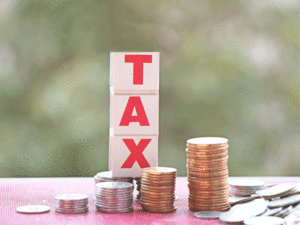 Getty Images
Getty ImagesThe Union Budget has amended the provisions under sections 206AB and 206CCA which levy higher TDS on specified persons. The amended rules are effective from April 1, 2022.
The last date of filing original ITR for FY 2021-22 was July 31, 2022. Thus, if you have not filed ITR by this date, then higher TDS will be applicable in FY 2023-24.
Sanjay Kumar, Partner, Deloitte India says, "The CBDT circular has been issued to determine the non-filers who are subject to higher tax withholding or collection. This circular is going to help the taxpayers in determining the non-filers and remove difficult in interpretation of the compliance provisions. Such circulars are beneficial to the taxpayers who file their tax returns in time, dutifully."
As per the amended provisions, higher TDS will be levied on individuals, if they satisfy the following conditions:
a) ITR not filed for the relevant previous financial year immediately preceding the financial year in which tax has to be deducted/collected and,
b) Aggregate TDS and TCS exceeds Rs 50,000 in that previous year.
To ascertain whether higher TDS is applicable or not in the current financial year (FY 2023-24), banks will be required to check if that individual has filed ITR or not for relevant previous financial year i.e., FY 2021-22. Secondly, banks will be required to check if total TDS and TCS in the previous financial year (FY 2021-22) exceeds Rs 50,000. Higher TDS will be applicable when both the conditions are met.
Changes made in Budget 2023
The Budget 2023 has provided relief to certain non-ITR filers from higher TDS applicable to their incomes. As per the changes effective from April 1, 2023, individuals who are not mandatorily required to file IT, then such individuals will not be classified as non-ITR filers for the specific function.
Incomes on which higher TDS is not applicable
Do note that higher TDS is not applicable on all incomes that are received by you during FY 2023-24. Higher TDS is not applicable on following incomes:
a) 192: Salaries
b) 192A: Withdrawal from PF account
c) 194B: Income by the way of winnings from lottery, Game shows & puzzles etc.
d) 194BB: Income from winnings from horse race
e) 194LBC: Income in respect of investment in securitization trust
f) 194N: Cash withdrawal in a financial year exceeding a specified financial year
g) 194-IA: Money received from sale of immovable property
h) 194-IB: Rent paid exceeds Rs 50,000 per month
i) 194M: Payments of certain sums by Individual & HUFs to resident contractors or professionals.
j) 194S: TDS on transfer of virtual digital asset (VDA) such as crypto assets etc., provided sales, gross receipts or turnover from the business carried on by him or profession exercised by him does not exceed one crore (in case of business) or Rs 50 lakh (in case of profession). This section is effective from July 1, 2022.
Other incomes such as dividends received from shares and mutual funds, interest received from fixed deposits, recurring deposits, interest received from small savings scheme (wherever applicable) etc, higher TDS will be applicable.
Higher tax rate that will be applicable on specified persons
As per income tax laws, higher TDS/TCS will be deducted at the rate, highest of the following on specified persons:
a) Twice the rate specified in the relevant provision of the Act; or
b) Twice the rate or rates in force; or
c) The rate of five per cent.
How will banks check if higher TDS has to be deducted?
As per the CBDT circular, a list of specified persons, on whom higher TDS is applicable in FY 2023-24, has been prepared taking FY 2021-22 as relevant financial year. The list contains names of taxpayers who did not file ITR in AY 2022-23 and aggregate TDS and TCS in FY 2021-22 exceeds Rs 50,000.
A bank or any other financial institution can use the Income-tax department's 'Compliance Check for Section 206AB & 206CCA' to ascertain whether higher TDS is applicable or not. Tax deductor will be required to enter single PAN or multiple PANs to know whether concerned individual is specified person on whom higher TDS is applicable.
Do note that during FY 2023-24, no new names will be added in the above-mentioned list. Further, if the specified person files valid ITR (filed & verified) for FY 2022-23 (AY 2023-24), i.e., this year, then his name would be removed from the list after the expiry of due date of filing ITR or actual date of filing valid ITR, whichever is later.
If the aggregate TDS & TCS does not exceed Rs 50,000 in last financial year i.e., FY 2022-23, then his/her name will be removed from the list of specified persons. This would be done on July 31, 2023.
Once the tax deductor has checked that an individual is not in a specified list, then they are not required to check again. However, tax deductor will be required to check for those names that are reflected in the specified persons list. This is because these names can be removed from the list.
(Your legal guide on estate planning, inheritance, will and more.)
Download The Economic Times News App to get Daily Market Updates & Live Business News.
Read More News on
(Your legal guide on estate planning, inheritance, will and more.)
Download The Economic Times News App to get Daily Market Updates & Live Business News.









 Get Unlimited Access to The Economic Times
Get Unlimited Access to The Economic Times
